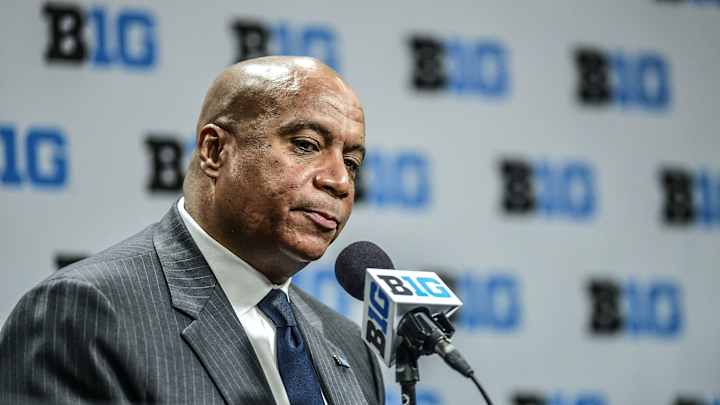Even if Big Ten Decision Ends Up Right, Early Bailout Unrest Will Linger for Warren

Sports Illustrated contributor Herb Gould recently broke down the problems surrounding the Big Ten's decision to cancel or postpone the season and explains why it's going to be a big issue for first-year commissioner Kevin Warren.
Here's that column in its entirety:
The first-year Big Ten commissioner's decision to pull the plug on the Big Ten’s 2020 football season may ultimately prove to be the right one. For all the grand plans and efforts of the SEC, ACC and Big 12, it remains to be seen whether they will be able to play football this fall.
The problem is, Warren and Big Ten leaders at individual schools are finding that it was big miscalculation to cancel things so early. There needed to be an appearance—a reality, actually—that every possible step had been taken to play some kind of virus-adjusted football season.
It’s admirable that Warren, who succeeded the legendary Jim Delany in January, wanted to continue Delany’s knack for leading college football in forward thinking. The problem is, this was a miscalculation that threatens to undermine his leadership into the future.
Delany would have made sure he had a consensus for such a critical decision. Warren has. . . a troubling amount of smoldering unrest.
On Aug. 5, the Big Ten announced an interesting conference-games-only schedule that would begin early and have multiple open dates, to allow postponed games to be rescheduled.
Less than a week later, on Aug. 11, before the football engine had even had a chance to be warmed up, the Big Ten announced that it would cancel its season because that was in the best interests of the health and safety of players. (Shortly after that, the Pac-12 joined the Big Ten and also shut down.)
That may prove to be true. But even now, the decision is looking premature to massive numbers of players, parents and many others. A petition started on social media by Ohio State quarterback Justin Fields has been signed by more than 600,000 people.
“Allow Big Ten players/teams to make their own choice,’’ Fields said, ``as to whether they wish to play or opt out this fall season.”
In addition, parents of football players at Nebraska, Iowa, Michigan and Penn State have sent letters to the Big Ten demanding that the season be reinstated.
So now what?
Do not hold your breath waiting for Warren to reverse course and come up with a plan to play this fall. More likely, Warren is holding his breath, waiting for the three conferences that are still planning to play to join the Big Ten and Pac-12 on the sidelines.
I still think that is where this season is headed. No.college football. Anywhere.
If you look at the ``optimism’’ states such as Florida, Georgia and Texas have shown in trying to reopen—and look at the ``exuberance’’ displayed by college students returning to campus in not only SEC Country but around the nation, that’s where the smart money is.
Even if the SEC, ACC and Big 12 persist and open their seasons, the example of Major League Baseball is discomforting. The Miami Marlins and St. Louis Cardinals both needed extensive shutdowns when nearly 20 players and staff tested positive. Multiply those numbers by the increased size of a college football entourage—and you have an advanced-degree problem to solve.
But at this point, a shutdown by the Persistent Three won’t really make Warren’s problem go away.
Even if there is no college football anywhere, Fields, the parents of players and all those other people who opposed the new commissioner’s quick shutdown trigger are unlikely to line up and thank him.
I fear that Warren will have a lot of fence-mending to do regardless of what happens from here
Clearly, he was put in a very difficult position. Before his first football season got under way, he had to make some decisions that would challenge the most experienced administrator..
He checked a ton of boxes as an excellent choice to succeed Delany. He was a high-ranking NFL executive, an attorney with an extensive sports-law background, a former student-athlete who would connect with student-athletes and their problems, a workaholic. If anyone has the credentials to succeed, it is Warren.
One thing that was missing on his resume, though, was extensive experience in the college-administration world. Unlike Delany and other major-conference commissioners before him, Warren was not a commissioner of a smaller conference or an athletic director at a power-conference institution. He doesn’t have the experience of networking.
As I have written here at TMG recently, the Power 5 need to figure out a new way to act in unison. Savvy leaders like Delany, Roy Kramer, Mike Slive and others used to be able to work together behind the scenes to come up with a unified front.
Kevin Warren and Pac-12 commissioner Larry Scott, another administrator who didn’t come up through the college-sports administrative ranks, don’t have those kinds of backgrounds.
While Warren has made some very good decisions in his first challenging year at the Big Ten helm, pulling the plug early on this football season is not one of them. And judging from the backlash, it is a decision that is likely to have lingering implications.
